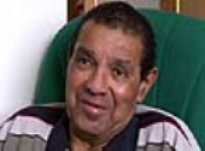Michael / 'Ace' - Interview 20

More about me...
Ace had waited over a year for a hip replacement operation when his surgeon told him he couldn’t operate because of the results of a blood test he had had. He was referred to another doctor who took two bone marrow samples. When he returned for the results Ace was told that he had a type of incurable cancer, the name of which he could not understand. He was very shocked and went straight to the pub and got drunk. His 88 year old mother, whom he lives with, was very upset, as were the rest of his family, and the news spoiled their Christmas.
'Ace' is attending a day unit for intravenous chemotherapy with an arsenic-based drug several times a week for 2 weeks, then has 2 weeks off. Visits to the unit can take several hours and are tiring.
'Ace' is attending a day unit for intravenous chemotherapy with an arsenic-based drug several times a week for 2 weeks, then has 2 weeks off. Visits to the unit can take several hours and are tiring.
'Ace' was surprised that he wasn't sick when having chemotherapy, thanks to the anti-sickness pills; he knew other people who were.
'Ace' was surprised that he wasn't sick when having chemotherapy, thanks to the anti-sickness pills; he knew other people who were.
'Ace' stopped work as a pianist because of a bad hip and has been living on benefits throughout his leukaemia treatment. He worries about how he will manage when he reaches pensionable age shortly.
'Ace' stopped work as a pianist because of a bad hip and has been living on benefits throughout his leukaemia treatment. He worries about how he will manage when he reaches pensionable age shortly.
I mean I’m sixty five in, probably haven’t got that long long left, I don’t know but my family seems to live to eighty-odd and, like, you know, we’re very good at long old old age, like, you know, I’ve got an aunt who’s ninety, ninety-odd and another auntie 84, mum’s 88, so we seem to live long so if I get over this then I might have another twenty years or so. You know.

